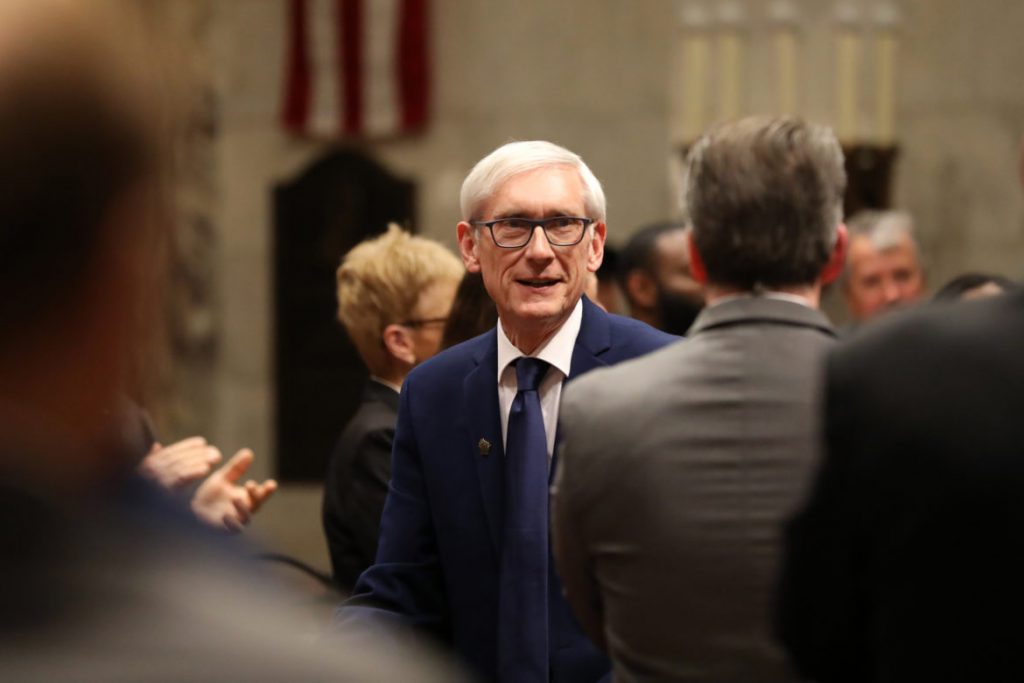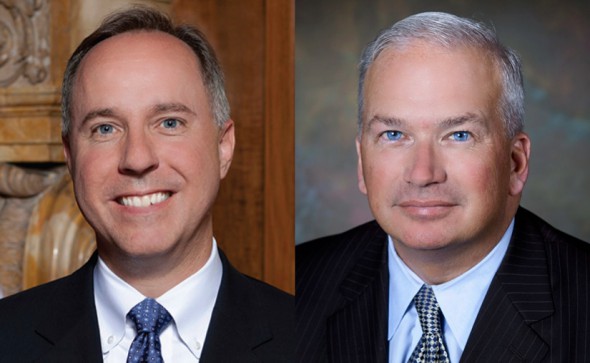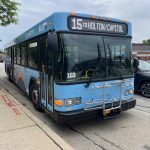Detente Ends for Evers, Legislature
Cooperation during pandemic ends as Vos, Fittzgerald blast governor on election timing.
Monday was not only a big day for news from Wisconsin on elections and democracy, it was a monumental day in the relationship between the Wisconsin Legislature, controlled by Republicans, and Gov. Tony Evers, a Democrat.
At the end of the day, quite literally, the Wisconsin Supreme Court ordered that the April 7 election take place with in-person voting, ruling in the Republican legislators’ favor. But not before the legislative leaders and the governor stared one another down, firmly entrenched as opponents, obliterating previous signs that their relationship was thawing.
This was after several weeks of detente during the COVID-19 crisis and even some kind words exchanged between the two partisan branches of Wisconsin government.
All that changed when Evers ordered a special session and Republicans leaders refused to convene to address holding the scheduled April 7 vote as an all-mail-in election to protect people’s safety during the COVID-19 pandemic.
The most explosive moments came when Evers ordered the April 7 election postponed because of coronavirus on Monday and Republicans immediately challenged Evers’ executive order in the state Supreme Court. (On top of appealing another case to the U.S. Supreme Court on extending the day for absentee ballots to be counted until April 13.) Each of the sides had indicated some sympathy to the other side’s viewpoint before this standoff.
Whatever happens in Tuesday’s election, it marks an already tense relationship among Wisconsin leaders taking a sharp turn for the worse in the middle of a pandemic crisis.
Detente disregarded
Legislative leadership has bristled multiple times now — over gun safety and school funding — when Evers has ordered them to hold a special session. And they were furious when he sent them a memo assigning them homework on topics they should address before adjourning session.
And after Monday’s executive order delaying the election they went straight to court to challenge to have it overturned.
But for a stretch during the COVID-19 pandemic, the leaders seemed to be getting along better. Both sides described regular meetings. Both parties indicated they were working together to solve problems and address the crisis.
Even disagreements were not volatile.
“You know, I want to give credit to Gov. Evers,” Assembly Speaker Robin Vos (R-Rochester) said during a March 25 news conference. “I agree with his decision to say that we are going to hold this election.”
Vos and Senate Majority Leader Scott Fitzgerald (R-Juneau) both discussed how they would sit down with the governor to see what they could do to work with him on COVID-19 issues in a legislative session “to cut red tape and make sure healthcare workers have what they need in a crisis,” and they were planning to do so.
They showed some mild displeasure about being surprised with the stay-at-home order the governor had issued on a Monday, after telling them over the weekend that he did not plan to do so. But it was more of a mention in passing and the tone otherwise was largely one of mutual respect indicative of thawing relationships.
When a reporter from The Wheeler Report said that the Legislature has the authority to adopt a joint resolution that would revoke the governor’s public health emergency and asked if they would consider doing it, the Republicans brushed the notion aside, saying it was something they had not asked counsel about.
A week later, at their next news conference on April 1, Vos had a few more criticisms, but still continued to talk about working together: “We appreciate that the people in Wisconsin know that there’s going to be an end to this and until then we’ve got to all fight together.”
He offered mild support of Evers’ move to call on the Wisconsin National Guard to work at polls: “If the National Guard does not have other duties, making sure that our communities are safe, I certainly would support using them in limited circumstances, where potentially there’s no poll workers or there’s a real short supply.”
Fitzgerald and Vos also said there was “general agreement” among most Republicans in both chambers that they would support a temporary suspension of the one-week waiting period before collecting unemployment benefits. Getting rid of that waiting period has long been a goal of Evers and Democrats.
The Republican leaders also suggested finding some balance that ballots had to be cast by the end of the day on election day, but could be counted for “some time period” after that, suggesting the end of the week as a possibility.
“I am calling the Legislature into a special session to do its part — just as all of us are — to help keep our neighbors, our families and our communities safe,” said Evers in issuing the special session order.
Vos and Fitzgerald responded saying that Evers’ “flip-flop” showed a lack of leadership: ““Unfortunately, it’s this type of feckless leadership Wisconsin has come to expect of the governor in the face of this crisis.”
The Legislature responded on Saturday at 4 pm as required, with just one person there to gavel the session open and then gavel it closed seconds later, without members present, adjourning until Monday. They repeated the same “skeletal session” action on Monday morning.
Meanwhile, Republicans appealed the federal court judge’s ruling to the U.S. Supreme Court and asked Justice Brett Kavanaugh to intervene in the Wisconsin election and block an extension of the deadline for counting absentee ballots to April 13.
The deep freeze
Around 12:45 p.m. on Monday Evers issued an executive order to delay the election, something he had stated earlier that he did not have the power to do.
“Frankly, there’s no good answer to this problem — I wish it were easy. I have been asking everyone to do their part to help keep our families, our neighbors, and our communities safe, and I had hoped that the Legislature would do its part — just as the rest of us are — to help keep people healthy and safe,” said Evers. “But as municipalities are consolidating polling locations, and absent legislative or court action, I cannot in good conscience stand by and do nothing. The bottom line is that I have an obligation to keep people safe, and that’s why I signed this executive order today.”
Fitzgerald and Vos responded with a joint statement announcing they would challenge Evers’ order in the Wisconsin State Supreme Court.
“The clerks of this state should stand ready to proceed with the election,” they said. “The governor’s executive order is clearly an unconstitutional overreach.”
They concluded: “Gov. Evers can’t unilaterally run the state.”
About 45 minutes later, Evers and his health and legal team spent more than an hour on the phone with reporters, explaining their actions. Evers was asked a number of times about his change of opinion, repeating that he could not stand by and do nothing.
“There’s not a sufficiently safe way to administer in-person voting tomorrow,” said Evers. “That’s why earlier today I signed Executive Order 74 to suspend in-person voting for the spring election, until June 9, and to call on the legislature to convene a special session on April 7, to take up legislation extending the date of the spring election to June 9, or another reasonable date, we can all agree on.”
He acknowledged he had been sticking with the April 7 date — siding with Republicans over members of his own party, including several mayors and local officials — but said that now circumstances had changed and the spread of the virus had worsened.
“There’s no shame in changing course to keep people safe and quite frankly to save lives, and our allegiance cannot be to party or ideology, it must be to the people of Wisconsin, and their safety,” said Evers.
Here is how Evers described his thought process evolving over the past weeks up until his order delaying the election early this afternoon:
“I did require them to go in a special session to resolve this problem, and I was responded to with a gavel in and gavel out twice now in the last couple of days. There’ve been several judicial actions going on at the same time and every time there was a decision the Republicans rushed to the forefront and took several steps to make sure that those decisions were overcome. Clearly, there was an issue of whether they wanted to make sure that people were safe or not.
“I was thinking about this all this weekend, the people of Wisconsin don’t spend all their waking hours thinking about whether Republicans or Democrats have the upper hand here, nor are they spending most of their time thinking about different court cases that go on ad nauseam.
“They’re sitting there saying, ‘I’m scared.’ … I decided that it was important for the governor of the state, since I haven’t had much luck, frankly, with the Legislature to take this step that transcends all that other stuff. This isn’t about politics. This isn’t about judicial issues in play. It’s about the people that are afraid for their future, afraid for their own personal safety. And I believe that I have an obligation to stand up for them.”
Asked if he had reached out to legislators before he gave the order, Evers said he had phoned and spoken with “each one of the Republican legislative leaders,” but did not elaborate on how those calls had gone.
Their public response sheds some light on the turmoil and bad blood that appears to once again define their relationship. They assert that Evers is disenfranchising voters.
In their suit to the court they called the executive order “an invasion by the Executive into the Legislative arena: setting the time, place, and manner of elections, as well as the terms of local officials. Prompt resolution of this legal dispute is categorically within the public interest because the Governor’s action significantly interferes with an ongoing election and will disenfranchise countless voters.
“Defying numerous state-election statutes and his countless previous statements that he clearly lacks legal authority to cancel tomorrow’s election, the Governor announced moments ago — at the eleventh hour — that he was doing just that,” stated the Republicans emergency petition to the Wisconsin Supreme Court. “The order is void for several, independent constitutional and statutory reasons, as the Governor has himself conceded.”
The Wisconsin Supreme Court ruling was decided 4-2 (with Justice Daniel Kelly, who is on the ballot for a 10-year term running against Judge Jill Karofsky recusing himself), ruling that the election will go on Tuesday April 7, and overruling Evers decision to postpone it
Reprinted with permission of Wisconsin Examiner.
More about the 2020 Spring Primary
- Why Don Natzke Couldn’t Vote - Enjoyiana Nururdin - Aug 9th, 2020
- Centers for Disease Control and Prevention’s Morbidity and Mortality Weekly Report highlights public health measures taken by the Milwaukee Health and Fire Departments, Department of Administration, Election Commission, and the Wisconsin Department of Health Services - City of Milwaukee Health Department - Aug 4th, 2020
- CDC Says Election Did Not Cause COVID-19 Spike - Erik Gunn - Aug 4th, 2020
- Pandemic Reduced Black Vote, Study Finds - Dee J. Hall - Jun 25th, 2020
- Did April Election Hike COVID-19 Cases? - Alana Watson - May 20th, 2020
- Elections Commission Notes ‘Lessons Learned’ - Henry Redman - May 19th, 2020
- Wisconsin Elections News: WEC Releases Analysis of Absentee Voting in April 7 Spring Election - Wisconsin Elections Commission - May 18th, 2020
- Election’s Impact on County’s COVID-19 Cases Unclear - Jeramey Jannene - May 6th, 2020
- Why State’s Voting By Mail Was Chaotic - Daniel C. Vock - May 4th, 2020
- At Least 40 COVID-19 Cases Tied to Election in Milwaukee - Graham Kilmer - Apr 24th, 2020
Read more about 2020 Spring Primary here
More about the Coronavirus Pandemic
- Governors Tony Evers, JB Pritzker, Tim Walz, and Gretchen Whitmer Issue a Joint Statement Concerning Reports that Donald Trump Gave Russian Dictator Putin American COVID-19 Supplies - Gov. Tony Evers - Oct 11th, 2024
- MHD Release: Milwaukee Health Department Launches COVID-19 Wastewater Testing Dashboard - City of Milwaukee Health Department - Jan 23rd, 2024
- Milwaukee County Announces New Policies Related to COVID-19 Pandemic - David Crowley - May 9th, 2023
- DHS Details End of Emergency COVID-19 Response - Wisconsin Department of Health Services - Apr 26th, 2023
- Milwaukee Health Department Announces Upcoming Changes to COVID-19 Services - City of Milwaukee Health Department - Mar 17th, 2023
- Fitzgerald Applauds Passage of COVID-19 Origin Act - U.S. Rep. Scott Fitzgerald - Mar 10th, 2023
- DHS Expands Free COVID-19 Testing Program - Wisconsin Department of Health Services - Feb 10th, 2023
- MKE County: COVID-19 Hospitalizations Rising - Graham Kilmer - Jan 16th, 2023
- Not Enough Getting Bivalent Booster Shots, State Health Officials Warn - Gaby Vinick - Dec 26th, 2022
- Nearly All Wisconsinites Age 6 Months and Older Now Eligible for Updated COVID-19 Vaccine - Wisconsin Department of Health Services - Dec 15th, 2022
Read more about Coronavirus Pandemic here























